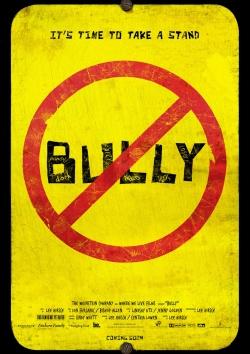Movie Meant for Teens Given R Rating for Language
Get downloadable PowerPoint presentation.
About/Disclaimer
What Happened:
By all accounts, the soon-to-be-released documentary Bully is a powerful film—a poignant look at a handful of harassed kids and teens and showing how bullying affects them. Some believe the film could be a catalyst for change.
Perhaps not everyone who should see it will be able to. Why not? Kids swear in the film—and they swore enough that the MPAA gave Bully an R rating. As such, the documentary will be restricted from being watched by youth under age 17 without an adult, and most high schools and middle schools will be unable to show it to their students.
The film’s makers have protested the rating, and more than 150,000 people have signed an online petition, hoping the MPAA will reconsider. “I can’t believe the MPAA is blocking American teenagers from seeing a movie that could literally save thousands of lives,” says teen Katy Butler, who started the petition.
While the MPAA agrees Bully is a worthwhile movie, the organization stands by its rating. “Bullying is a serious issue and is a subject that parents should discuss with their children,” says Joan Graves, head of the Classification and Ratings Administration. “Unfortunately, there is a misconception about the R rating of this film limiting the audience to adults. This is not true. The voluntary ratings system enables parents to make an informed decision about what content they allow their children to see in movies.”
Talk About It:
The makers of Bully say the film is a documentary, and the language in the film reflects how kids and teens actually talk. If you were going to give ratings to the conversations you hear at school, how would they be rated?
Do you curse? Do your friends curse? Does it bother you when other people swear? Are there some swear words that offend you and others that don’t?
If you’re under 17, do you think your parents would allow you to see Bully? Would they be put off by the rating? Should they be? Would you like to see the film? Do you think other people should?
In
The bullying and language in Bully show that school can be a pretty tough place…and that probably goes for even many Christian schools, as well. Would your parents be surprised about what you’re exposed to at school? Do you talk with your parents about most of what happens there? Are there things you keep from them so they won’t worry?
What the Bible Says:
“Do not let any unwholesome talk come out of your mouths, but only what is helpful for building others up according to their needs, that it may benefit those who listen” (
“But now you must rid yourselves of all such things as these: anger, rage, malice, slander and filthy language from your lips” (
“Finally brothers, whatever is true, whatever is noble, whatever is right, whatever is pure, whatever is lovely, whatever is admirable—if anything is excellent or praiseworthy—think about such things” (




